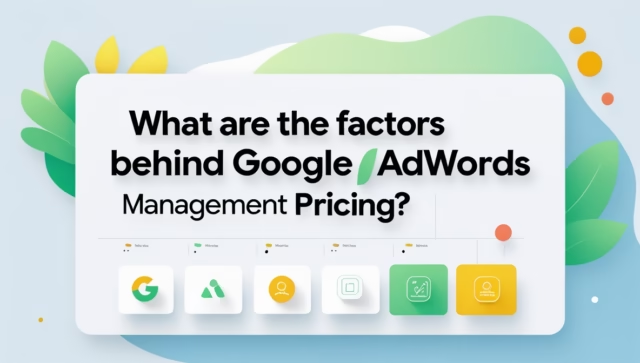When I initially started running sponsored ads for small businesses, the most common question I got was, “Why does it cost so much to manage Google Ads?” That’s a good question. Companies want to get the most out of their money without paying too much for services that don’t help them.
A lot of the time, we meet clients who think that Google AdWords Campaign Management is only about setting a budget and getting clicks. But the truth is that good management is a lot more than that. There are a lot of things that go into how prices are set, like strategy, planning, execution, testing, and making changes as needed.
Let’s talk about what affects the price of managing Google AdWords, how agencies and freelancers set their rates, and what businesses should expect based on their specific needs.
What is Google AdWords Management?
Professionals or specialized agencies handle Google Ads administration, which includes planning, creating, and maintaining advertising campaigns on the Google Ads platform. This service usually comprises researching keywords and audiences, producing and testing several versions of ad copy, determining bid strategies, and managing the budget to get the most return on investment.
It also entails monitoring conversions, analyzing performance statistics, and consistently implementing changes to enhance results. To stay ahead in the ad sector, you typically have to do competitor analysis and send regular reports to clients to keep them up to date. When companies hire someone else to manage their Google Ads, they are paying for a mix of knowledge, strategic thought, time, and ongoing improvement.
These services make sure that campaigns stay competitive and cost-effective over time. The cost of this kind of management might vary a lot based on how complicated the campaigns are, how many services are offered, and how experienced the people in charge of the account are.
Factors That Affect Google AdWords Management Pricing
Let’s break down the most common factors that impact pricing:
Campaign Complexity
Some businesses only need a single search campaign targeting one city. Others might want campaigns across multiple regions, each with unique landing pages, ad groups, and tailored messaging.
More complex campaigns take more time and require careful planning. Agencies typically charge more in these cases due to:
- Multiple campaign types (Search, Display, Video, Shopping)
- Large numbers of ad groups or product feeds
- Location or language targeting
- Custom funnels or landing pages
For instance, a nationwide eCommerce business will pay more than a local dentist because the scope of work is drastically different.
Monthly Ad Spend
We often see that ad spend directly influences management fees. Why? Managing $1,000 in monthly ad spend differs from managing $50,000. Larger budgets mean more data to analyze, more opportunities to test, and higher stakes.
There are usually three models here:
- Flat fee: Regardless of budget
- Percentage of ad spend: Often 10–20%
- Tiered pricing: Set fee ranges based on spend brackets
So, if a client is spending $10,000/month and the agency charges 15%, they’re paying $1,500 in management fees. This model aligns the agency’s success with the client’s ad performance.
Scope of Services Provided
Some clients only want someone to run ads. Others want the full suite, from campaign setup to landing page design and monthly audits.
Here’s how expanded service scope can affect pricing:
- Conversion tracking setup
- Remarketing campaigns
- Custom dashboard reporting
- Competitor and market research
- Landing page optimization
These added services require additional skill sets and time, so they naturally raise the price.
Agency Experience and Reputation
When businesses approach us, they often ask, “Why does that agency charge more?” The answer usually comes down to experience and results.
Agencies with a strong reputation, Google Partner certifications, and proven client success stories tend to charge more, and rightly so. Their expertise reduces costly errors and can deliver better returns faster.
That said, newer agencies or freelancers might offer lower pricing to attract clients. While this can be cost-effective, it often comes with a learning curve or slower campaign growth.
Customization and Strategy Development
Not all Google Ads campaigns are built the same. Some businesses operate in highly competitive spaces, necessitating constant refreshment of ads, rework of strategies, and testing of offers.
These businesses often require:
- Custom targeting strategies
- Extensive keyword and market research
- Frequent campaign restructuring
- In-depth split testing and conversion tracking
All of this adds to the workload and influences what a manager might charge. Generic campaigns are cheaper, but they rarely deliver the same performance as tailored ones.
Reporting and Analytics
We’ve had clients ask for weekly reports, live dashboards, and full conversion breakdowns. Others are fine with a monthly PDF summary.
Naturally, the depth and frequency of reporting also affect pricing. Agencies that provide data visualization, access to live dashboards, and in-depth analytics usually charge more.
These reports help clients:
- Track ROI clearly
- Identify top-performing ads and audiences
- Adjust budgets quickly based on performance
Moreover, analytics support faster scaling, a valuable asset for growing brands.
Contract Type and Duration
Agencies often offer pricing based on how long you commit. Short-term or project-based work might cost more upfront, while long-term contracts may come with discounts.
Types of arrangements include:
- Month-to-month (flexible but often pricier)
- 3–6-month retainers (balance of commitment and savings)
- Annual contracts (lowest monthly cost but long-term commitment)
Some agencies even offer setup fees upfront, followed by smaller ongoing management fees.
Common Pricing Models for Google AdWords Management
Let’s take a closer look at how pricing is structured across the industry:
Flat Monthly Fee
A “Flat Monthly Fee” is a fixed amount charged every month for a service or product, regardless of usage or consumption.
- Best for businesses with predictable needs
- Provides cost clarity upfront
- Ranges from $300 to $5,000 depending on campaign size
Percentage of Ad Spend
Percentage of Ad Spend refers to the proportion of a company’s budget allocated to advertising relative to total expenditures or revenue, often used to assess marketing investment efficiency.
- Aligns the manager’s incentives with campaign success
- Commonly 10% to 20% of total spend
- Makes more sense for budgets above $2,000/month
Performance-Based Pricing
Performance-based pricing is a pricing strategy where the cost of a product or service is tied to the measurable results or outcomes it delivers.
- Fees based on leads, conversions, or sales generated
- Riskier for agencies, but attractive for clients
- Requires tight tracking and clear goal definitions
Hourly Consulting
Hourly consulting offers flexible, expert advice on demand, billed based on the time spent addressing specific client needs.
- Ideal for audits or one-time advice
- Rates typically range from $75 to $250/hour
- Not suitable for long-term management
Each model has its pros and cons. We often recommend that businesses make their choice based on their budget, goals, and the need for either full-time support or periodic optimization.
How to Choose the Right Google Ads Manager?
Your money is important, but so is picking the appropriate individual or team to run your campaign. When choosing a company, you should think about whether they have worked in your field before and whether they can show you proof of successful campaigns in the past.
Check how often they update you on their work and clarify their pricing. You should also find out if they need long-term contracts or if they are open to changing their plans.
Be careful if they give you unclear answers regarding strategy, promise “guaranteed results,” don’t track conversions, or aren’t a Google Search Partner. Clear expectations, good communication, and a shared commitment to growth are much more important than fancy promises or a nice website. Transparency, trust, and a commitment on always getting better are the keys to a successful partnership.
Conclusion
Google AdWords management pricing varies based on factors like campaign complexity and the experience of the team handling it. Many businesses either overpay for simple setups or underpay and miss out on growth opportunities.
The cost should reflect the actual work and results delivered. Key factors influencing pricing include campaign size and strategy, your ad budget, required tools and reporting, the expertise of the account manager, and the contract terms. If you’re exploring options or reassessing your current provider, take the time to evaluate your true needs and compare them with what’s being offered.
When choosing a partner, prioritize expertise and performance over the lowest management fee. Look for a team that treats your budget with care, communicates clearly, and focuses on improving results. Reach out to a certified Google Ads expert for a free audit or consultation to ensure your ad spend drives real revenue.







